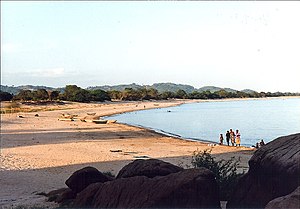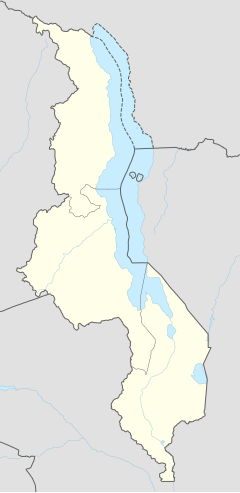
Malawi, officially the Republic of Malawi, is a landlocked country in Southeastern Africa that was formerly known as Nyasaland. It is bordered by Zambia to the west, Tanzania to the north and northeast, and Mozambique to the east, south and southwest. Malawi spans over 118,484 km2 (45,747 sq mi) and has an estimated population of 19,431,566. Malawi's capital is Lilongwe. Its second-largest is Blantyre, its third-largest is Mzuzu and its fourth-largest is its former capital, Zomba. The name Malawi comes from the Maravi, an old name for the Chewa people who inhabit the area. The country is nicknamed "The Warm Heart of Africa" because of the friendliness of its people.
The History of Malawi covers the area of present-day Malawi. The region was once part of the Maravi Empire. In colonial times, the territory was ruled by the British, under whose control it was known first as British Central Africa and later Nyasaland. It became part of the Federation of Rhodesia and Nyasaland. The country achieved full independence, as Malawi, in 1964. After independence, Malawi was ruled as a one-party state under Hastings Banda until 1994.
Communications in Malawi includes the country's postal, telephone, television, radio and internet services.

Transportation in Malawi is poorly developed. The country of almost 14 million has 39 airports, 6 with paved runways and 33 with unpaved runways. It has 797 kilometres of railways, all narrow-gauge and about 45 percent of its roads are paved. Though it is landlocked, Malawi also has 700 km (435 mi) of waterways on Lake Malawi and along the Shire River.

Malawi is a landlocked country in southeast Africa. It is wholly within the tropics; from about 9°30S at its northernmost point to about 17°S at the southernmost tip. The country occupies a thin strip of land between Zambia and Mozambique, extending southwards into Mozambique along the valley of the Shire River. In the north and north east it also shares a border with Tanzania. Malawi is connected by rail to the Mozambican ports of Nacala and Beira. It lies between latitudes 9° and 18°S, and longitudes 32° and 36°E.

Lilongwe is the capital and most populated city of the African country of Malawi. It has a population of 989,318 as of the 2018 Census, up from a population of 674,448 in 2008. In 2020 that figure was 1,122,000. The city is located in the central region of Malawi, in the district of the same name, near the borders with Mozambique and Zambia, and it is an important economic and transportation hub for central Malawi. It is named after the Lilongwe River.
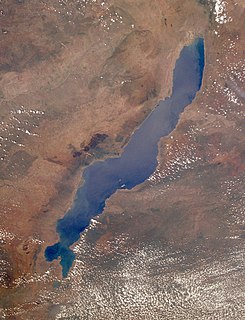
Lake Malawi, also known as Lake Nyasa in Tanzania and Lago Niassa in Mozambique, is an African Great Lake and the southernmost lake in the East African Rift system, located between Malawi, Mozambique and Tanzania.
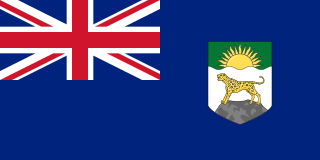
Nyasaland was a British protectorate located in Africa that was established in 1907 when the former British Central Africa Protectorate changed its name. Between 1953 and 1963, Nyasaland was part of the Federation of Rhodesia and Nyasaland. After the Federation was dissolved, Nyasaland became independent from Britain on 6 July 1964 and was renamed Malawi.

The British Central Africa Protectorate (BCA) was a British protectorate proclaimed in 1889 and ratified in 1891 that occupied the same area as present-day Malawi: it was renamed Nyasaland in 1907. British interest in the area arose from visits made by David Livingstone from 1858 onward during his exploration of the Zambezi area. This encouraged missionary activity that started in the 1860s, undertaken by the Universities' Mission to Central Africa, the Church of Scotland and the Free Church of Scotland, and which was followed by a small number of settlers. The Portuguese government attempted to claim much of the area in which the missionaries and settlers operated, but this was disputed by the British government. To forestall a Portuguese expedition claiming effective occupation, a protectorate was proclaimed, first over the south of this area, then over the whole of it in 1889. After negotiations with the Portuguese and German governments on its boundaries, the protectorate was formally ratified by the British government in May 1891.
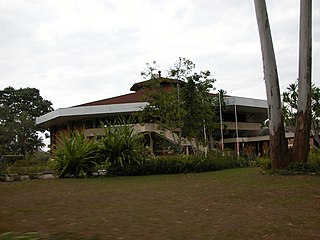
Zomba is a city in southern Malawi, in the Shire Highlands. It is the former capital city of Malawi.
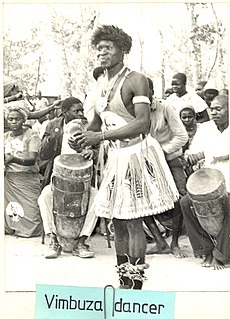
The Tumbuka is an ethnic group found in Northern Malawi, Eastern Zambia and Southern Tanzania. Tumbuka is classified as a part of the Bantu language family, and with origins in a geographic region between the Dwangwa River to the south, the North Rukuru River to the north, Lake Malawi to the east, and the Luangwa River. They are found in the valleys near the rivers, lake as well as the highlands of Nyika Plateau, where they are frequently referred to as Henga although this is strictly speaking the name of a subdivision.
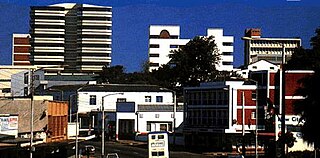
Blantyre is Malawi's centre of finance and commerce, and its second largest city, with an enumerated 800,264 inhabitants as of 2018. It is sometimes referred to as the commercial and industrial capital of Malawi as opposed to the political capital, Lilongwe. It is the capital of the country's Southern Region as well as the Blantyre District.

The Central Region of Malawi, population 7,523,340 (2018), covers an area of 35,592 km². Its capital city is Lilongwe, which is also the national capital. The region has an outlet on Lake Malawi and borders neighbouring countries Zambia and Mozambique. The Chewa people make up the majority of the population today.

The Southern Africa-Indian Ocean Division (SID) of Seventh-day Adventists is a sub-entity of the General Conference of Seventh-day Adventists, which coordinates the Church's activities in the southern portion of Africa, which include the nations of Angola, Ascension Island, Botswana, Comoro Islands, Lesotho, Madagascar, Malawi, Mauritius, Mozambique, Namibia, Réunion, São Tomé and Príncipe, Seychelles, South Africa, Swaziland, Zambia, Zimbabwe; as well as St. Helena and Tristan da Cunha, territories of the United Kingdom, and the Kerguelen Islands, territory of France. Its headquarters is in Centurion, South Africa. The Division membership as of June 30, 2021 is 4,281,416.
The Church of the Province of Central Africa is part of the Anglican Communion, and includes 15 dioceses in Botswana, Malawi, Zambia and Zimbabwe. The Primate of the Church is the Archbishop of Central Africa. Albert Chama is the current archbishop, being installed on 20 March 2011, succeeding Bernard Amos Malango who retired in 2007. From 1980 to 2000, Walter Khotso Makhulu, a noted Anti-Apartheid activist, was Archbishop as well as Bishop of Botswana. Archbishop Chama continues to serve as Bishop of Northern Zambia, and is the second Zambian to be Archbishop of Central Africa.

Republic of Malawi – sovereign country located in southeastern Africa. Malawi is bordered by Zambia to the northwest, Tanzania to the north and Mozambique, which surrounds it on the east, south and west and is separated from Malawi by Lake Malawi. The origin of the name Malawi is unclear; it is either derived from that of southern tribes, or from the "glitter of the sun rising across the lake". Malawi is a densely populated country with a democratically-elected, presidential system of government.

Education in Malawi stresses academic preparation leading to access to secondary school and universities. However, few students go on to high school or university. The dropout rate is also very high particularly among primary school pupils.
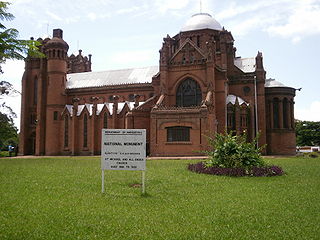
According to 2012 statistics about 85% of Malawi's 11 million people are Christian, with over half of the population Protestant and another 20% Roman Catholic. Of the Protestant churches the Church of Central Africa, Presbyterian is one of the largest Christian groups, but here are also smaller numbers of Anglicans, Baptists, evangelicals, Seventh-day Adventists, Jehovah's Witnesses and African independent churches.

Elizabeth II was Queen of Malawi from 1964 to 1966, when Malawi was an independent sovereign state and a constitutional monarchy within the Commonwealth of Nations. She was also the sovereign of the other Commonwealth realms, including the United Kingdom. The 1964 Constitution of Malawi vested executive power in the monarch as head of state, though her constitutional roles were delegated to her representative, the governor-general, Sir Glyn Smallwood Jones.

Visitors to Malawi must obtain a visa from one of the Malawian diplomatic missions unless they come from one of the visa exempt countries or countries eligible for visa on arrival.
